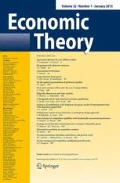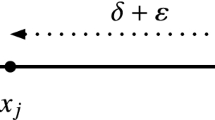Abstract
We axiomatically characterize the Theil ordering of income inequality. In addition to the uncontroversial axioms of anonymity, homogeneity, replication invariance, strong directedness, and a standard continuity property, we appeal to both an independence and a decomposability axioms. These two axioms are ordinal implications of Theil decomposability, the central axiom in previous characterizations of the Theil index. To the best of our knowledge, the present is the first fully ordinal characterization of this index.


Similar content being viewed by others
Notes
Foster (1983) main result further shows that continuity can be dispensed with by strengthening the Directness axiom and assuming the Pigou–Dalton principle of transfers instead.
This restriction consists of the index applied only to two-person societies, with one person earning a proportion \(t\) of the total income and the other one earning the remaining proportion \(1-t\).
These simple societies are ones where a proportion \(1-t\) of the population has no income at all and the remaining proportion shares all of society’s income evenly.
We denote by \(\succ \) and \(\sim \) the asymmetric and symmetric parts of \(\succcurlyeq \).
We adopt the convention that \(0\ln (0)=0\).
A related property is the unit-consistency axiom introduced by Zheng (2007a). It guarantees that, as long as income is measured in the same unit in all societies, inequality rankings are independent of this unit. We are not sure as to the extent to which substituting this weaker axiom for homogeneity would affect our results. Examples of unit-consistent measures may be found in Zheng (2007a, b) and del Rio and Alonso-Villar (2010).
References
Aaberge, R.: Axiomatic characterization of the Gini coefficient and Lorenz curve orderings. J. Econ. Theory 101, 115–132 (2001)
Aczél, J., Daróczy, Z.: On Measures of Information and Their Characterizations. Academic Press, New York (1975)
Atkinson, A.: On the measurement of inequality. J. Econ. Theory 2, 244–263 (1970)
Barret, C.R., Salles, M.: On a generalisation of the Gini coefficient. Math. Soc. Sci. 30, 235–244 (1995)
Ben Porath, E., Gilboa, I.: Linear measures, the Gini index, and the income-equality trade-off. J. Econ. Theory 64, 443–467 (1994)
Bossert, W.: An axiomatization of the single-series Ginis. J. Econ. Theory 50, 82–92 (1990)
Bourguignon, F.: Decomposable income inequality measures. Econometrica 47, 901–920 (1979)
Chakravarty, S.: Inequality, Polarization and Poverty. Springer, Berlin (2009)
Cowell, F.: On the structure of additive inequality measures. Rev. Econ. Stud. 47, 521–531 (1980)
Cowell, F.: Measurement of inequality. In: Atkinson, A.B., Bourguignon, F. (eds.) Handbook of Income Distribution, vol. 1, pp. 87–166. North-Holland, Amsterdam (2000)
Cowell, F., Kuga, K.: Additivity and the entropy concept: an axiomatic approach to inequality measurement. J. Econ. Theory 25, 131–143 (1981a)
Cowell, F., Kuga, K.: Inequality measurement: an axiomatic approach. Eur. Econ. Rev. 15, 287–305 (1981b)
del Rio, C., Alonso-Villar, O.: New unit-consistent intermediate inequality measures. Econ. Theory 42, 505–521 (2010)
Donaldson, D., Weymark, J.A.: A single-parameter generalization of the Gini indices of inequality. J. Econ. Theory 22, 67–86 (1980a)
Donaldson, D., Weymark, J.A.: Ethically flexible Gini indices for income distribution in the continuum. J. Econ. Theory 29, 353–358 (1980b)
Foster, J.E.: An axiomatic characterization of the Theil measure of income inequality. J. Econ. Theory 31, 105–121 (1983)
Frankel, D., Volij, O.: Measuring school segregation. J. Econ. Theory 146, 1–38 (2001)
Goldberg, P., Pavcnik, N.: Distributional effects of globalization in developing countries. J. Econ. Lit. 45, 39–82 (2007)
Helpman, E., Itskhoki, O., Redding, S.: Inequality and unemployment in a global economy. Econometrica 78, 1239–1283 (2010)
Lasso de la Vega, C., Urrutia, A.: The ‘Extended’ Atkinson family: the class of multiplicatively decomposable inequality measures, and some new graphical procedures for analysts. J. Econ. Inequal. 6, 212–225 (2008)
Lee, P.M.: On the axioms of information theory. Ann. Math. Stat. 35, 415–418 (1964)
Russell, R.: A note on decomposable inequality measures. Rev. Econ. Stud. 52, 347–352 (1985)
Shorrocks, A.F.: The class of additively decomposable inequality measures. Econometrica 48, 613–625 (1980)
Shorrocks, A.F.: Inequality decomposition by population subgroups. Econometrica 52, 1369–1385 (1984)
Shorrocks, A.F.: Aggregation issues in inequality measurement. In: Eichhorn, W. (ed.) Measurement in Economics, pp. 429–451. Physica Verlag, Heidelberg (1988)
Theil, H.: Economics and Information Theory. North-Holland, Amsterdam (1967)
Theil, H.: Statistical Decomposition Analysis. North-Holland, Amsterdam (1972)
Thon, D.: An axiomatization of the Gini coefficient. Math. Soc. Sci. 2, 131–143 (1982)
Weymark, J.A.: Generalized Gini inequality indices. Math. Soc. Sci. 1, 409–430 (1981)
Yaari, M.: A controversial proposal concerning inequality measurement. J. Econ. Theory 44, 381–397 (1988)
Yitzhaki, S.: On an extension of the Gini inequality index. Int. Econ. Rev. 24, 617–628 (1991)
Zheng, B.: Unit-consistent decomposable inequality indices. Economica 74, 97–111 (2007a)
Zheng, B.: Unit-consistent poverty indices. Econ. Theory 31, 113–142 (2007b)
Author information
Authors and Affiliations
Corresponding author
Additional information
We thank the Spanish Ministerio de Educación y Ciencia (project SEJ2009-11213) for research support. We also thank Mikel Bilbao for his invaluable help.
Rights and permissions
About this article
Cite this article
Lasso de la Vega, C., Urrutia, A. & Volij, O. An axiomatic characterization of the Theil inequality ordering. Econ Theory 54, 757–776 (2013). https://doi.org/10.1007/s00199-012-0739-6
Received:
Accepted:
Published:
Issue Date:
DOI: https://doi.org/10.1007/s00199-012-0739-6



